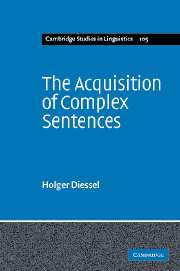Book contents
- Front matter
- Contents
- Figures
- Tables
- Acknowledgements
- Abbreviations
- 1 Introduction
- 2 A dynamic network model of grammatical constructions
- 3 Towards a definition of complex sentences and subordinate clauses
- 4 Infinitival and participial complement constructions
- 5 Complement clauses
- 6 Relative clauses
- 7 Adverbial and co-ordinate clauses
- 8 Conclusion
- Appendix
- References
- Author index
- Subject index
7 - Adverbial and co-ordinate clauses
Published online by Cambridge University Press: 22 September 2009
- Front matter
- Contents
- Figures
- Tables
- Acknowledgements
- Abbreviations
- 1 Introduction
- 2 A dynamic network model of grammatical constructions
- 3 Towards a definition of complex sentences and subordinate clauses
- 4 Infinitival and participial complement constructions
- 5 Complement clauses
- 6 Relative clauses
- 7 Adverbial and co-ordinate clauses
- 8 Conclusion
- Appendix
- References
- Author index
- Subject index
Summary
In traditional grammar, adverbial and co-ordinate clauses are categorically distinguished: adverbial clauses are classified as subordinate clauses and co-ordinate clauses are considered nonembedded sentences. For English, as well as for many other languages, this analysis is problematic, because there are no sufficient criteria to establish a clear-out division between adverbial and co-ordinate clauses. Rather, adverbial subordination and clausal co-ordination form a continuum of related constructions. In what follows, I refer to the continuum of adverbial and co-ordinate clauses as conjoined clauses.
Like complement and relative clauses, conjoined clauses evolve from simple nonembedded sentences, but the development takes a different pathway: while complement and relative clauses evolve via clause expansion, conjoined clauses develop through a process of clause integration. The development originates from two independent utterances that are pragmatically combined in the ongoing discourse. Starting from such discourse structures, children gradually learn the use of complex sentences in which two or more clauses are integrated in a specific grammatical unit.
- Type
- Chapter
- Information
- The Acquisition of Complex Sentences , pp. 149 - 173Publisher: Cambridge University PressPrint publication year: 2004



